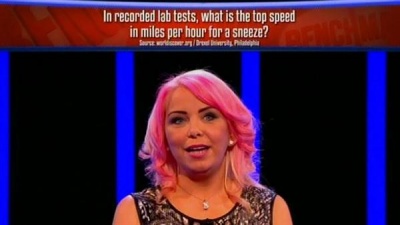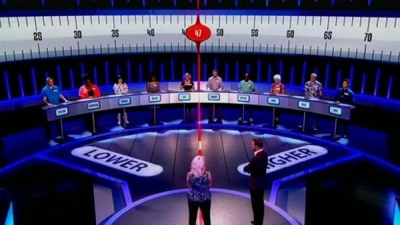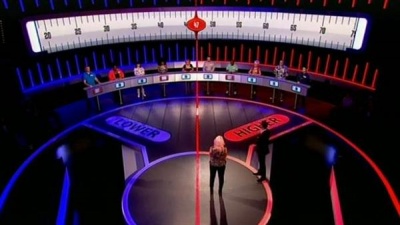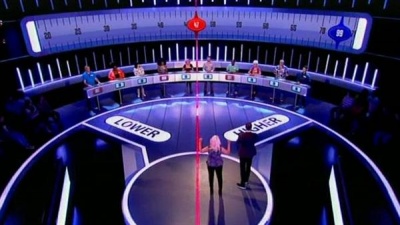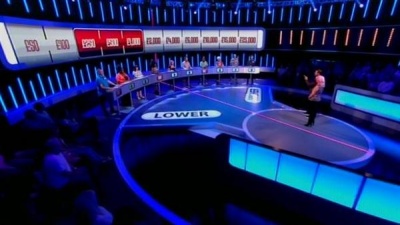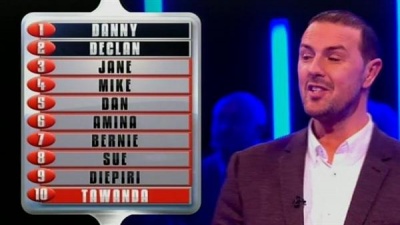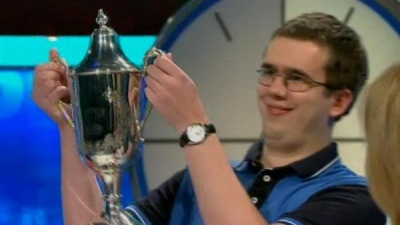Weaver's Week 2015-06-21
Last week | Weaver's Week Index | Next week
The following review isn't so much of a programme as of its channel.
Benchmark
Victory Television Scotland for Channel 4, 1-12 June
"The show where the answers are average, but nothing else is."
Host Paddy McGuinness builds up Benchmark as something remarkable. Or at least good enough to distract people from Tipping Point.
The scene is set in the opening question. We're talking through the episode from 12 June, which began by asking "What percentage of people believe they're of below-average intelligence?" The top two players from yesterday's show are brought forward to answer this question.
Rather than just give the answer, host Paddy McGuinness asks the players to commentate and speculate on it. It's not going to be a quick show, this. Already, we can see that we're going to have trouble: we're not fans of Mr. McGuinness's work, we find it banal and uninspired. Particularly on Take Me Out: yes, the dating show is the decade's third-biggest new format, just more important than The Voice, well behind The Great British Bake Off. Take Me Out may be popular, but we find it sexist claptrap.
Back to the game. Do 59% of people believe they're thicker than the average? Do 29% of people believe they are dumber than the next person? Of course not. The answer, according to a Yougov panel, is 2%. Though one contestant is out by a factor of four, the other is out by a factor of five.
The bulk of Benchmark is taken up by similar questions. They can be fact-based questions ("what's the speed of the fastest sneeze?") or survey-based questions ("how many chickens are eaten each year in the UK?") Each time, the ten players behind the benches have been surveyed, and given numerical answers to this question. The three "least accurate" answers have been discarded, and the remainder "averaged" to produce a "benchmark".
Some parts of this are never properly explained. By "least accurate", do they mean "greatest absolute difference", or "greatest logarithmic difference", or something else? This matters: in the chicken question (for which the right answer is 3.2m), an answer of 500 is closer to the right answer than 6.6m. But the first is out by a factor of twelve-and-a-half, the other by a factor of two.
Even the concept of "average" is not explained. Do they mean "arithmetic mean", or "median", or "geometric mean", or some other measure? Again, this matters: the median figure is the middle one of the seven, and one of the players will have submitted that answer. Arithmetic mean is a good measure when answers are close to each other. We see this in the speed of a sneeze: most players will answer below 150mph. Geometric mean carries more meaning when there's a wild spread of answers, as in the chicken consumption – is it in the hundreds of thousands, is it in the hundreds of millions?
Anyway. The benchmark has been established. Paddy will identify the three worst performers, expose one of their answers, and chat to one of them. The conversation is part banter, and part Paddy berating them for being so stupid. Giving the wrong answer might help the player to work out the order of magnitude for the question. Chatting to the player will help the show fill its hour. And it'll give the Paddy McGuinness fan club what they've tuned in to see, Paddy being cheeky with people.
After a few minutes of this, Paddy finally asks the player to "make their move". The player's been stood at the middle of the studio, straddling a red line as a measuring tape is on the video wall. The player can step right, indicating the correct answer is "higher" than the benchmark, or step left for "lower". The player's choice is indicated by a red light, the rejected option in blue; this is the exact reverse of normal game show practice.
The actual answer is not prefixed by Bruce shouting "the actual answer is", because that would be the IBA-mandated skill element on Play Your Cards Right. No, it's demonstrated on the video screen as a marker moving up and down the tape. Eventually, it will come to rest. Throughout, the screen concentrates on the answer. We never get to see the player's reaction as the answer emerges, we only see it some moments later.
A correct answer to the question allows the player to advance their rangefinder along a path. The range always covers three values, initially £50, £100, £250. The first right answer progresses to £100, £250, £500. The later values are £1000, £2000, £4000, £6000, then £10,000, £15,000 and a top prize of £25,000.
The show continues in this manner for half an hour. Paddy asks a question. Paddy banters with the players at the bench. Seven questions are asked. Seven decisions are made. From question five, only the three "nearest" answers are used to form the "benchmark", and the player is required to "double" one answer: this will move their rangefinder two spaces rather than one.
Before each commercial break, Paddy McGuinness gives a call-and-lose contest just for viewers watching live. This doesn't appear on the 4player.
Eventually, the range finder has come to a halt. The final player is going to face three percentage questions. These questions are asked, and answers are locked in, before we find how accurate or otherwise they are. For each question, the player is required to ask someone from the bench, and they're obligated to give a precise integer answer.
The final countdown works like Cliffhanger from The Price is Right. Each part of the range is split into 33 segments, and one of those segments is ticked off for each 1% of error in the player's guess. So if the player suggests 35% of babies are given two or more middle names, and the actual answer is 11%, they're going to move down by 24 segments. Again, the stop comes while we're looking at the scoreboard, not the player.
Before the end credits, there's one final piece of business. Throughout the game, the "benchmarkers" have been ranked by the accuracy of their answers. The worst performer will leave the show. The two best will face tomorrow's head-to-head question. The remainder are trapped on the show, destined to spend their days with Paddy McGuinness until they win money, or lose badly, or go mad with boredom. On average, a player will spend five days there. The average player will spend much longer, because they won't win or lose.
Most viewers won't care about the mathematical uncertainties. They will care about the little things. No live reaction shots. Players who are there forever. Paddy McGuinness wittering on, and on, and on some more. The bench's answers appear in microscopic boxes – they might work on massive tellies in super-HD, but not on the Week's 26-inch SD set. Yes, it's good to play along at home, but we found it insufferably slow
There's a delicious contradiction: the better the bench plays in the main game, the more difficult it is for the player, because the bench will be indeterminately close to the right answer. But the show ignores this fact. The better the bench advises in the end game, the more money the player will win, and the show makes a great play of this fact.
Discussion at Bother's Bar winkled out that – at least in the earliest episodes – the benchmarks tended to be too low, and were almost always too low when the question talked about thousands or more. The denizens also noted that the final round could be gamed by always picking 50%.
Now, it's possible that these things were also spotted by the producers, and fixed later in the run – with almost all the contestants coming back tomorrow, it's not possible to air shows out of order. Will we find out? Don't know.
The average viewing figure for 4pm on Channel 4 is 604,000 viewers. We might adjust this for the season: temperatures of 20 degrees and 15 hours of sun will reduce viewing by about 15%, so we'll declare a benchmark of around 500,000. The first episode had overnight figures of 380,000, falling to 213,000 by that Thursday, and 150,000 a week later. This is a rotten figure; it's below Countdown, it's below Blue Peter, it's on a par with America's Next Top Model on UK Living.
Channel 4 has bigger problems than one under-performing game show. Two years ago, we stepped through Channel 4's daytime schedule, explaining why it was being beaten in every slot. Nothing has changed since. Channel 4 hasn't had a new hit in daytime since Three in a Bed at the start of the decade. This malaise is spreading to the evening schedule, which is also becoming dull and predictable.
Channel 4's remit is to be new and innovative. This isn't borne out by its one renewable daytime show, a revamped Fifteen-to-One with Sandi Toksvig. The original ran from 1988 to 2003. Channel 4's nighttime shows are also looking backwards: last weekend saw a one-off revival of "Oh No It's Chris Evans On Friday", coupled with a lying documentary about the 1990s. (Hate to burst your bubble: the decade wasn't Oasis, The Word, and Trainspotting. It was Robson and Jerome, Gladiators, and Noel's House Party.)
Where is the urgency about Channel 4? Where is the innovation on the schedule? There has been precisely one successful new primetime show in the past four years: a mixture of 8 Out of 10 Cats (est. 2004) with Countdown (est. 1982). Who has the confidence of Sebastian Scott, of Jonathan Ross, of Chris Evans? Where is the next Jimmy Carr? Why has Radio 1 done more with vloggers than Channel 4? Videos don't even work on the radio!
No surprise that Channel 4 has decided to show the remaining episodes of Benchmark later in the year. The show isn't that bad: with a different host and a faster pace, we could watch avidly. As it is, undemanding telly on a failing channel isn't going to cut it. Not when the opposition includes the decade's second-biggest hit Tipping Point, and the opposition includes a cookery show on BBC1 that we plan to review next week.
This Week and Next
We had to re-write the record books on The Chase, when a team took £90,000 from the daytime programme. Final player Lauren dropped £77,000 into the prize fund; alongside Craig and Rakesh, the team comfortably beat Shaun Wallace.
An era ends in Germany, as Stefan Raab announces he's to leave ProSieben. He has been a part of many hit shows, including Unser Star Für Oslo, a regular comedy discussion show, devised wok racing (coming soon to KYTV), and the all-night competition Schlag den Raab. The latter came to the UK as Beat the Star. Herr Raab's contract lapses at the end of the year, and says he leaves "on best terms possible."
The Eurovision Young Dancers prize was awarded on Friday. Viktoria Nowak was the winner, she represented TVP from Poland. British viewers don't get to see the winning performance because the BBC doesn't choose to participate in this event.
Staffing changes at The X Factor in the UK. We already knew that Caroline Flack and Olly Murs were going to host the show. This week, we found the critical panel would be enhanced by Rita Ora and Nick Grimshaw. The "Radioactive" hitmaker and Style the Nation host will join Statler and Waldorf, sharing all the knowledge they know in a series of ten-second gobbets. ITV2's The Xtra Factor gains Rochelle Humes from The Saturdays, and Melvin Odoom from The Bungalow.
BARB ratings in the week to 7 June.
- The Eastenders was the top show, with 7.55m viewers. Have I Got News for You the top game, 5.15m.
- The Cube came back in second place with 3m, and The Chase takes bronze with 2.25m viewers.
- 8 Out of 10 Cats Does Countdown took 1.65m viewers, and Antiques Road Trip was level with Big Brother, both on 1.43m.
- A series high for A League of Their Own, 835,000 saw the sportish entertainment on The Satellite Channel.
- "Celebrity" Love Island came back to 635,000 on ITV2. Over on ITV4, we understand a million saw Andy Murray playing tennis; the official figure of 590,000 is an average from late morning to nightfall.
Not a classic week for new game shows. Cardiff Singer of the World comes to an end (BBC4, Sunday), repeats of Ready Steady Cook come to the Food Network (weekdays), and Joe McElderry completes his transition from pop star to grannies' favourite when he reaches Countdown (Fri). How badly are we struggling? One of the highlights is a previously unseen episode of The Common Denominator, omitted during the afternoon run in 2013. This missing show goes out at the slightly less popular time of 5.20 next Saturday morning.
Photo credits: Victory Television Scotland, YTV, Eurovision / NDR.
To have Weaver's Week emailed to you on publication day, receive our exclusive TV roundup of the game shows in the week ahead, and chat to other ukgameshows.com readers, sign up to our Yahoo! Group.


